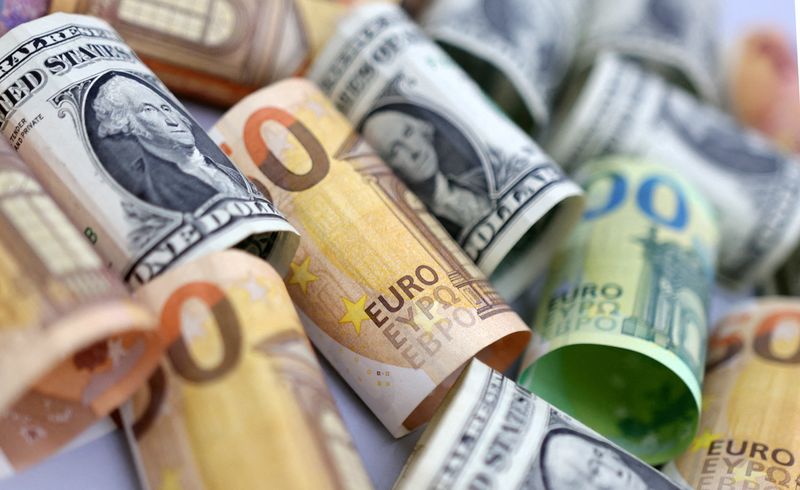By Laura Matthews
NEW YORK (Reuters) -The U.S. greenback weakened towards the yen on Thursday, as softer-than-expected U.S. financial knowledge and rising confidence for a Financial institution of Japan interest-rate hike despatched it tumbling to a close to one-month low towards the Japanese forex.
Current remarks from BOJ Governor Kazuo Ueda and his deputy Ryozo Himino have made clear {that a} hike will a minimum of be mentioned at subsequent week’s coverage assembly. Markets see a couple of 79% likelihood of a 50 foundation level enhance. [IRPR]
Japan’s annual wholesale inflation held regular at 3.8% in December on stubbornly excessive meals prices, knowledge confirmed on Thursday.
The dollar was down 0.81% towards the yen at 155.2, its lowest since Dec. 19.
“We anticipated that there would be a nuanced U.S. dollar behavior, that () would likely be stronger relative to a number of currencies, but would be weaker relative to the Japanese yen,” stated Kristina Hooper, chief world market strategist, at Invesco U.S. “I think the general direction for JPY and the general direction for the dollar suggests that we will have a stronger yen to dollar.”
The greenback was weaker towards the euro, which rose 0.1% to $1.03, as merchants digested a slew of combined financial information to gauge the outlook for the Federal Reserve’s price cuts this 12 months.
U.S. retail gross sales rose 0.4% final month after upward revisions the earlier month, knowledge from the Commerce Division’s Census Bureau confirmed.
In the meantime, the variety of People submitting new functions for unemployment advantages elevated greater than anticipated final week, however remained at ranges exhibiting a wholesome labor market.
The Philadelphia Fed Business Index, which jumped to 44.3 in January, was the lone shock because the forecast was for a studying of minus 5.
That left – a measure of the worth of the dollar relative to a basket of foreign currency – down 0.05% at 108.97.
Amo Sahota, director at Klarity FX in San Francisco, stated Wednesday’s softer client costs knowledge continues to drive the markets’ tone, driving expectations that the Fed would nonetheless be pushing in direction of two price cuts this 12 months.
However the signal of disinflation is occurring when inflation might re-escalate, relying on the incoming administration’s commerce coverage.
“The markets are generally in a slightly more upbeat mood, but in a holding pattern here until we get through Monday,” stated Sahota.
That is when Donald Trump returns to the White Home with some insurance policies analysts anticipate will increase progress in addition to enhance value stress.
One other focus for markets on Thursday, was the nomination listening to of Trump’s selection of Scott Bessent to move the Treasury Division.
Bessent is anticipated to maintain a leash on U.S. deficits and to make use of tariffs as a negotiating software, mitigating the anticipated inflationary impression of financial insurance policies anticipated from the Trump administration.
“So far, he hasn’t really said anything too far away from what we’re kind of expecting,” Sahota stated. “This is a government … which needs to resolve itself on spending. So, we’re looking at government spending to come down. They really want to implement back in the tax cuts, we’ve seen that headline come through.”
Merchants who’ve been rising extra anxious about inflation responded with aid to Wednesday’s U.S. knowledge, shopping for shares and sending benchmark 10-year Treasury yields down greater than 13 foundation factors.
Treasury yields slipped on Thursday, after Federal Reserve Governor Christopher Waller stated three or 4 curiosity cuts this 12 months had been nonetheless attainable if U.S. financial knowledge weakened additional.
Sterling was down 0.13% at $1.2228 towards the greenback, having additionally earlier dropped sharply towards the yen on Thursday as traders centered on financial coverage divergence after final week’s selloff in gilts and the pound.
, seen on the entrance traces of tariff threat, was pinned close to the weak finish of its buying and selling band at 7.3316. [CNY/]
Foreign money
bid
costs at
16
January
08:54
p.m. GMT
Descripti RIC Final U.S. Pct YTD Pct Excessive Low
on Shut Change Bid Bid
Earlier
Session
Greenback 108.96 109.03 -0.05% 0.43% 109.4 108.
index 82
Euro/Doll 1.0299 1.029 0.1% -0.51% $1.0315 $1.0
ar 26
Greenback/Ye 155.19 156.505 -0.83% -1.36% 156.42 155.
n 135
Euro/Yen 159.84 160.97 -0.7% -2.07% 161.08 159.
77
Greenback/Sw 0.9111 0.9129 -0.18% 0.41% 0.9142 0.91
iss
Sterling/ 1.223 1.2245 -0.09% -2.19% $1.226 $1.2
Greenback 173
Greenback/Ca 1.4393 1.4339 0.39% 0.1% 1.4403 1.43
nadian 24
Aussie/Do 0.621 0.6227 -0.24% 0.39% $0.6248 $0.6
llar 192
Euro/Swis 0.9382 0.9389 -0.07% -0.12% 0.9394 0.93
s 71
Euro/Ster 0.8418 0.8402 0.19% 1.75% 0.8438 0.84
ling 07
NZ 0.5606 0.5616 -0.11% 0.25% $0.5633 0.55
Greenback/Do 82
llar
Greenback/No 11.3595 11.3256 0.3% -0.05% 11.4002 11.3
rway 108
Euro/Norw 11.701 11.6542 0.4% -0.58% 11.714 11.6
ay 48
Greenback/Sw 11.1507 11.1536 -0.03% 1.21% 11.1937 11.1
eden 288

Euro/Swed 11.485 11.4806 0.04% 0.16% 11.499 11.4
en 75




